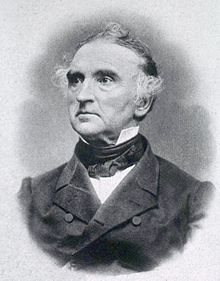
Back Justus von Liebig Afrikaans Justus von Liebig ALS يوستوس فون ليبيغ Arabic يوستوس فون ليبيج ARZ Justus von Liebig AST Yustus fon Libix Azerbaijani یوستوس فون لیبیش AZB Юстус Лібіх Byelorussian Юстус фон Либих Bulgarian Justus von Liebig BS
Justus von Liebig ForMemRS | |
|---|---|
 Liebig c. 1866 | |
| Born | 12 May 1803 |
| Died | 20 April 1873 (aged 69) Munich, Kingdom of Bavaria, German Empire |
| Education | |
| Known for | See list
|
| Awards | Albert Medal (1869) Pour le Mérite (1851) Légion d'honneur (1850) Copley Medal (1840) |
| Scientific career | |
| Fields | Chemistry |
| Institutions | |
| Doctoral advisor | Karl Wilhelm Gottlob Kastner |
| Doctoral students | |
| Other notable students | |
Justus Freiherr von Liebig[a] (12 May 1803 – 20 April 1873)[2] was a German scientist who made major contributions to the theory, practice, and pedagogy of chemistry, as well as to agricultural and biological chemistry; he is considered one of the principal founders of organic chemistry.[3] As a professor at the University of Giessen, he devised the modern laboratory-oriented teaching method, and for such innovations, he is regarded as one of the most outstanding chemistry teachers of all time.[4] He has been described as the "father of the fertilizer industry" for his emphasis on nitrogen and minerals as essential plant nutrients, and his popularization of the law of the minimum, which states that plant growth is limited by the scarcest nutrient resource, rather than the total amount of resources available.[5] He also developed a manufacturing process for beef extracts,[6] and with his consent a company, called Liebig Extract of Meat Company, was founded to exploit the concept; it later introduced the Oxo brand beef bouillon cube. He popularized an earlier invention for condensing vapors, which came to be known as the Liebig condenser.[7]
- ^ Kumar, Prakash (2012). Indigo plantations and science in colonial India. Cambridge: Cambridge University Press. p. 124. ISBN 978-1-107-02325-3. Retrieved 4 November 2014.
- ^ Priesner, Claus (1985), "Liebig, Justus Freiherr von", Neue Deutsche Biographie (in German), vol. 14, Berlin: Duncker & Humblot, pp. 497–501; (full text online)
- ^ Royal Society of London (1 January 1875). "Obituary Notices of Fellows Deceased". Proceedings of the Royal Society of London. 24: xxvii–xxxvii. Retrieved 5 November 2014.
- ^ Rines, George Edwin, ed. (1920). . Encyclopedia Americana.
- ^ (UNIDO), International Fertilizer Development Center (IFDC), United Nations Industrial Development Organization (1998). Fertilizer manual (3rd ed.). Boston: Kluwer Academic. p. 46. ISBN 978-0-7923-5011-8. Retrieved 6 November 2014.
{{cite book}}: CS1 maint: multiple names: authors list (link) - ^ Judel, Günther Klaus (2003). Justus Liebig, Georg Giebert und der Fleischextrakt (PDF) (in German). University of Giessen.
- ^ Cite error: The named reference
Canslerwas invoked but never defined (see the help page).
Cite error: There are <ref group=lower-alpha> tags or {{efn}} templates on this page, but the references will not show without a {{reflist|group=lower-alpha}} template or {{notelist}} template (see the help page).